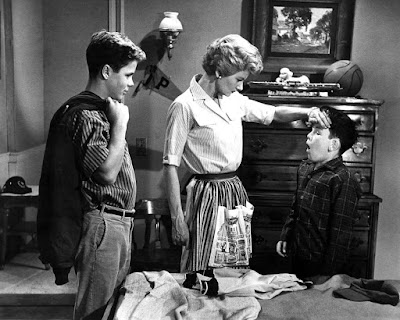I’ve written about my favorite classic TV books in the past,
and it’s always a joy when new ones appear that deserve a place in your
collection. At a time when the market has never been more under-served, I am delighted
to offer not one but two enthusiastic recommendations.
First up: The Electronic Mirror, written by my
fellow classic TV blogger Mitchell Hadley. If you like Comfort TV you would also enjoy reading Hadley’s wonderful It’s About TV blog. You
might even enjoy it more, but if you do keep that to yourself.
The book’s subtitle is
“What classic TV tells us about who we were and who we are.” The short answer
to that is “Quite a bit.” For the longer answer, pick up the book.
As someone of the author’s approximate
age and life experience, I found myself in agreement with many of his
conclusions; the loss of the common cultural touchstones that television used
to provide, before there were 400 channels and time-shifting technology; the
communal experience of TV watching that has also disappeared; the worldview
portrayed and the values expressed in shows from an earlier era, that might seem
strange, foreign, perhaps even offensive to current generations – and why such
condemnation is short-sighted.
Preaching to the converted?
Absolutely. I nodded with every page turn like a Republican watching Hannity. But one does not have to prefer
the Clampetts to the Kardashians to enjoy The
Electronic Mirror. Anyone with a broader interest in the evolution of pop
culture will find much to discover here: how cop shows from Dragnet to Law and Order may influence our perspective on crime and
punishment; how one episode of a nearly forgotten series called Medic says as much about views on
marriage and family in the 1950s as a sociology textbook; how situation comedies
from the 1960s helped America win the Cold War (really!)
This is a book from someone
that gets it – why these shows are not just entertaining but important, and
worthy of thoughtful study and reflection.
From this outside look into classic TV, we now turn to an inside look at how some of its
shows were created, through the memories of the men and women who wrote them.
Sitcom Writers Talk Shop features interviews with 16 remarkable writers,
including Carl Reiner, Norman Lear, Leonard Stern, James L. Brooks, Larry
Charles and David Lee. In addition, there are Forewords by Ed Asner and Carol
Kane.
This is familiar terrain
for author Paula Finn, whose father, Herb Finn, wrote for
The Flintstones, Gilligan’s Island and The Brady Bunch, among others. Part of
her childhood was spent on the sets of such TV classics as The Patty Duke Show, Mr. Ed
and That Girl – experiences that
surely sound like a dream come true for so many of us who longed to enter those
fictional worlds for a little while.
Finn uses the Q & A
format for her interviews, which is one I’ve always liked. Especially here,
when the content provided by interviewees is the sole purpose for the existence
of a book like this. She asks the questions most of us would ask to these
writers, and then lets them take the floor.
There are familiar stories
here – Reiner on creating The Dick Van Dyke Show, Lear on his
battles over the controversial content in All
In The Family. But there is much else to savor, such as how Leonard Stern
recalled the challenges of working for Jackie Gleason, and the hilarious
‘notes’ he gathered from networks. One of them complained that there was “too
much dancing” in a Fred Astaire special.
I’ve always liked seeing
the names of married couple Austin and Irma Kalish in the credits, so I was
especially pleased to get to know them better, and to learn how they could
catch the rhythms and sensibilities of sitcoms as different as Family Affair and Maude. And did Treva Silverman really write a couple of memorable Mary Tyler Moore Show episodes with a
creative boost from marijuana?
The one caveat for fans of
the Comfort TV era is that the last third of the book focuses on shows that
aired in the 1990s and beyond – most notably The Simpsons. But even here it’s interesting to see how the shows
have changed but the approach to how they are crafted has not.
One gets the feeling that all
of these writers, despite dealing with temperamental stars and humorless
network executives and silly censors, still had the time of their lives.
Both The Electronic Mirror and Sitcom Writers Talk Shop are available from Amazon.







Mr. Hofstede, have you read Jonathan Etter's 2003 book "Quinn Martin, Producer"? If so, what did you think of it?
ReplyDeleteI have not read it - will check it out.
ReplyDeleteDavid, thanks so much for the very kind words about The Electronic Mirror. I'm grateful, and humbled!
ReplyDeleteI love Mitchell Hadley's blog and will need to check out his book! I enjoyed Paula Finn's book very much (and was fortunate enough to interview her about it).
ReplyDeleteDavid, thank you so much for your review! And thanks for your kind words, too, Rick!
ReplyDelete